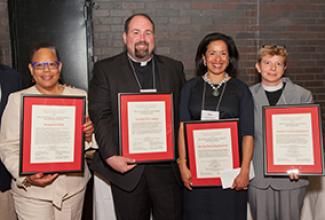At Episcopal City Mission's annual fundraising dinner on June 9, keynote speaker Sister Simone Campbell spoke about how it’s easy to become overwhelmed and paralyzed in the face of the world’s needs, and counseled choosing and taking action on just one thing. She also recommended "holy curiosity and sacred gossip" as a social action method: “We have to ask the question: Is justice happening here?"--and then spread the word, she said.
Here, two of ECM's social justice award winners, the Rev. Ed Cardoza and the Rev. Liz Steinhauser, offer their take on Campbell's advice.
Cardoza is the founder and executive director of Still Harbor, whose programs support individuals and organizations in discerning their call and commitment to service and help social justice activists develop spiritual practices that sustain their work.
Steinhauser is the director of youth programs at St. Stephen's Church in Boston, where her community organizing and leadership development work touches young lives through school-church partnerships, church-based enrichment and employment programs and a diocesanwide antiviolence coalition.
What’s an insight you’ve gained from working on your “one thing” that might help others take action on theirs?
Ed Cardoza: "When beginning reflection and discernment around a social justice action, look around at those gathered. How many people in the room reflecting and discerning are directly impacted by the injustice? Far too few of our efforts to bring about justice and peace are led by members of the communities impacted--we need to pause and ask ourselves: Why is that the case? And then we need to do something about it."
Liz Steinhauser: "My one thing, and the 'one thing' that St. Stephen's Youth Programs works on, is support for the healthy development of all young people. The trick about that being the 'one thing' is that it means working on many things simultaneously. High quality public education, safe neighborhoods, employment opportunities and professional development for teens, physical and emotional health for families, affordable and available out-of-school time programs and true value for diverse communities are all necessities that create a healthy and just environment for young people to grow and thrive. Rather than being overwhelming, this intersection of issues is part of what keeps me engaged. And it offers a constant reminder that the work cannot be done by me alone! Being part of a team that is pulling together to create justice and build the kingdom of God is challenging and motivating in the best ways."
What’s some sacred gossip from your part of the vineyard that you’d like to pass along for the greater good?
Ed Cardoza: "Most disaster relief agencies, including some of the most well known, do a poor job at building back better and differently. The organizations that do well bring a large percentage of funds raised directly to the country. When giving donations after a natural disaster look for non-profits and charities that have a history of giving communities money to build roads, sewers, schools, hospitals and homes."
Liz Steinhauser: "Have you heard that in the City of Boston, 7,300 teens have applied to the Department of Youth Employment and Engagement to get a summer job for July and August? This would be great news, since we know that summer employment is one of the most effective ways to curb urban violence (read more here). The challenge is that the city has the funding to hire only 3,200 of those teens, a mere 44 percent. What can we do to help the other 56 percent get jobs?
"Have you heard that at one of the Boston public elementary schools they have run out of money to hire substitute teachers to cover classrooms, even though there are three more weeks to go of school? Yes, it is true! The budget of the school only provides for a certain amount of money each year for subs and that line has been exhausted. School was extended due to snow and many teachers called out earlier in the year due to harsh weather. So the other day, two second-grade teachers were out. The 26 students who were in each of those classrooms were split up among other classes, creating groups of nearly 40 students. How can we expect teachers to teach or students to learn in these conditions?
"Have you heard that shootings are up in Boston this year? Yes, they are, and by 6 percent so far this year. That might not seem like much but the change is clearly related to race and poverty, as shootings have gone down in wealthier neighborhoods like Back Bay and the North End and gone up in neighborhoods where rates of poverty are higher, such as Dorchester and Roxbury. Those neighborhoods have seen a 30 percent increase in shootings so far this year over the same months in 2014. Don't you think we should do something to really address the easy and often illegal accessibility to guns?"

